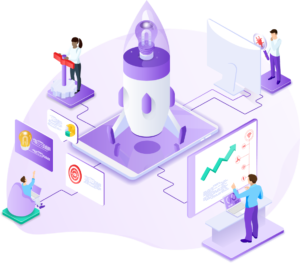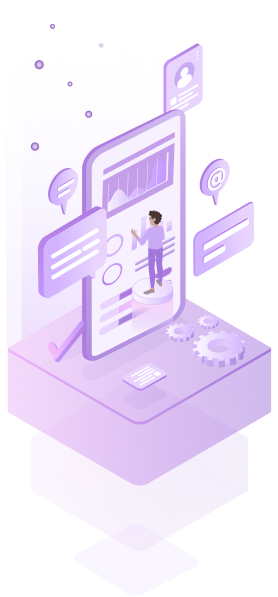Being flexible and creative aren’t just nice to have in the business world; they’re necessary. At PieSoft, a company based in Pennsylvania, USA, we truly understand how these things work.
We are a global service provider and technological partner for startups worldwide. Our priority is putting people first. We want to make sure that technology is an easy and important part of our clients’ success stories.
Understanding Our Clients: From the Point of View of a Startup
As a growing center of new ideas and risky businesses, startups face unique problems:
Rapid Scaling
New businesses need to be able to change and grow quickly. We customize our software to be adaptable and expandable, so it can evolve alongside the startups we collaborate with.
Strategic Use of Resources
New businesses often have few resources to work with. PieSoft makes sure that our custom software solutions help businesses reach their long-term goals by making the best use of their resources.
Promoting Innovation
The drive to come up with new ideas is at the heart of every business. Our software solutions reflect this, as they have features that are as unique as each startup.
We at PieSoft don’t just make software; we get to know each startup’s heart and soul and make sure that our technical skills match their goals.
Scalability and flexibility are at the heart of our solutions
PieSoft doesn’t make custom software in a way that works for everyone. Startups require quick change and growth, so we design our products to effectively meet these needs.
Adaptive Software Solutions
We create software that meets current needs and prepares for future changes and growth.
Seamless Integration
Our software seamlessly integrates with other systems, ensuring smooth changes and operations
Competitive Advantage
Our software helps startups be more competitive by generating new ideas and improving business operations.
Learn about the unique problems and needs of software startups
Startups must know the software needs, as they make ideas fast and market conditions constantly change. We have improved the way we do things at PieSoft to deal with these problems:
- Rapid Market Adaptation: Startups often have to change direction quickly in response to comments from the market or new chances. PieSoft creates flexible custom software for startups to easily adjust their technology to match evolving business strategies.
- Budget and Resource Limits: Startups usually don’t have a lot of money or resources to work with. When we make custom software, we focus on creating affordable and practical solutions to make the most of every dollar spent. We create helpful software that meets business goals without exceeding the startup’s budget.
- Needs for Scalability: As a business grows, its software must be able to grow with it. Our software meets current needs and can also be expanded to meet future ones. This means that as a business grows, it doesn’t have to buy new tools all the time.
- Innovation and Differentiation: Coming up with new ideas and being different from the competition are two things that startups love. Startups can use custom software to add features and functions that make them stand out in the market. At PieSoft, we collaborate with customers to comprehend their objectives and create standout software for their product or service.
- Security and Data Protection: Startups that deal with private data need strong security methods. We make sure that the custom software we make has the latest security measures built in. This protects against data breaches and cyber threats, which are crucial for businesses that are growing.
PieSoft helps startups succeed by providing custom software development services that meet their unique needs. We want to create software and assist startups in reaching their full potential in today’s challenging business environment.
Custom software can help startups by giving them flexibility, scalability, and a competitive edge
We know how important custom software is for startups to grow and be successful. Here are some of the main cons:
- Flexibility and adaptability: It’s important to be able to change with the times to meet customer and market needs. We make custom software that is naturally flexible, so startups can change and update their software as their business grows. Ready-made software may lack the important quality of always meeting the current and future needs of the business. Ensuring that the software being used can meet these needs is important.
- Scalability for Growth: Startups are always changing and growing quickly. Our software can handle more users and tasks without needing to start over, thanks to its scalability. Startups need to grow without technology limitations to expand their business effectively.
- Seamless Integration: To run their businesses, startups often use a number of different systems and methods. PieSoft can create software that integrates well with other systems, boosting productivity and facilitating staff learning. Integrating ensures the startup’s technology works well, speeding up processes and increasing overall productivity.
- Making the market more competitive: Having a unique software solution can help startups stand out in a big way. Custom software helps startups stand out by providing tailored features that meet their specific needs and leverage their unique opportunities. Startups can differentiate themselves and provide extra value to customers by offering unique features not found in regular software.
Because of these benefits, custom software is more than just a tool; it’s a strategic asset for startups that helps them deal with the challenges of starting a business and sets them up for long-term success and growth.
Learning About the Lifecycle of Custom Software Development: From Idea to Launch
It takes a long time for custom software development for startups to turn an idea into a fully functional product. Here is a more detailed look at the steps:

- Conceptualization and Ideation: This is the first step in getting to know the startup’s main idea. It includes brainstorming sessions, talks to get a sense of the startup’s mission, and tests to see if the proposed software solution will work.
The development process starts with a list of the project’s main goals, its scope, and any problems that might come up. - Planning and Design: Planning in great detail is very important. At this time, you’ll make a roadmap, list the technical requirements, and plan the software’s architecture. Designing also includes making designs for the user experience (UX) and the user interface (UI). These designs make sure that the software works well and looks good too.
- Growth and Implementation: This is the part where the real writing of code and making of software happens. Based on the requirements set out in the planning part, developers write code, create features, and add functionalities. As part of this process, the software is updated and changed on a regular basis to make sure it meets the needs of the startup.
- Testing and Quality Assurance: The software is put through a lot of tests to make sure it works well and doesn’t have any bugs. This includes different kinds of testing, like user acceptance testing, unit testing, and integration testing. This step is very important to make sure the software works well in a variety of situations and use cases.
- Deployment and Launch: The program is ready to be used once it has been tested. In this case, the software needs to be set up in a live system and made available to users. Users are often trained and given help before and after the start to make sure everything goes smoothly.
- Maintenance and always making things better: When software is released, it’s still being worked on. Maintenance is important for fixing any problems that come up after launch, keeping the system up to date, and adding new features as the startup grows.
The software stays useful and effective by constantly getting better based on user comments and changing market trends. - Managing a project and involving stakeholders: All steps of the development lifecycle depend on good project management. It makes sure the job stays on track, stays within its budget, and finishes on time.
Keeping stakeholders involved and informed throughout the process is important for openness and makes sure that the end product fits with the startup’s goals and vision.
To make software that not only meets the short-term goals of a startup but also helps it grow and change over time, it’s important to understand and manage these stages well.
Challenges and Risks in Custom Software Development: How to Handle Common Problems and Manage Quality
While custom software creation has many benefits, it also has some challenges and risks. Understanding these and coming up with ways to deal with them is important for the job to go well.
- Scope Creep:
Problem: Scope creep happens when the project’s goals get bigger than what was originally planned. This usually causes delays and costs to go over budget.
Mitigation: To stop scope creep, make sure there is a clear project scope from the start and include all important parties in the planning process. The project can also stay on track with regular check-ins and agile methods. - Miscommunication and Misalignment of Expectations:
Risk: If the development team and stakeholders don’t talk to each other clearly, there may be problems with the end product.
Mitigation: It’s important to talk to each other often and clearly. Everyone is on the same page about the project’s progress and what’s expected by using collaborative tools and having regular update meetings. - Problems and difficulties with integration:
Problem: Adding new software to systems that are already in place or making complex features can be very hard from a technical point of view.
Mitigation: Doing a lot of research and feasibility studies during the planning phase and hiring experienced developers can help you deal with complicated technology issues. - Budget Overruns:
Problem: Software development projects can sometimes go over budget, which can put a strain on the company’s finances.
Mitigation: Managing financial risks is easier when you make budgets that are realistic, include backup plans, and keep a close eye on project costs. - Problems with Quality and Performance:
Making sure the software is of good quality and works well in a variety of settings is important but can be hard.
Putting in place thorough testing stages, such as performance and user acceptance testing, helps find and fix problems before the launch. - Risk Management and Quality Assurance:
You need a strong plan for risk management. Finding possible risks at the beginning of the job and having backup plans ready makes them easier to handle.
Quality assurance should happen all the time during the development phase. Not only does it test the software, but it also makes sure that best practices are used during the creation process. - Change Management: It’s hard to adjust to changes, whether they’re caused by the market or by technology. Changes can be made to the development process without throwing the project off track if it is open and agile.
- Data safety and following the rules:
It is very important to keep data safe and follow all laws and rules, especially when working with private user data.
Strong security protocols and keeping up to date on compliance requirements help protect against breaches and legal problems.
Getting these problems solved takes careful planning, skilled execution, and ongoing management. By being aware of and getting ready for these possible problems, the risks of custom software development can be greatly reduced, which will result in a more successful and dependable software solution.
The Importance of Custom Software for New Businesses and What the Future Holds
As you learn more about custom software creation, you’ll see how important it is for startups. Custom software is more than just a tool; it helps startups come up with new ideas, grow, and be successful in the market.
- An Important Asset for New Businesses: Custom software is more than just code; it’s an important asset for businesses. It helps companies deal with unique problems, quickly adapt to changes in the market, and come up with new solutions that set them apart in their fields.
- Empowering Through Flexibility and Scalability: Custom software’s flexibility and scalability are very useful because they let companies change their technology as their business grows, making sure they are always on the cutting edge of efficiency and effectiveness.
- Integration and Competitive Advantage: Custom software that can work with current systems and add new features gives startups a big advantage over their competitors because they can give their customers something truly unique.
In the near future, the world of custom software creation is set to see some exciting changes:
- Technologies that are just starting to appear: AI, IoT, and blockchain will continue to be very important. When they are added to custom software solutions, they will spur new ideas and give companies more options.
- Focus on User Experience (UX) Will Grow: More personalized and easy-to-use software solutions will become a top concern, with a focus on UX growing.
- Sustainable and Socially Responsible Software: As people around the world become more aware of environmental and social problems, startups will look for software solutions that are not only useful, but also long-lasting and good for society.
More and more people are working from home and on global teams, which will lead to the creation of software that makes it easier for people to work together and from home.
In conclusion, custom software creation is an important part of running a successful business in the 21st century. As technology changes, so will the chances for startups to come up with new ideas and do well. Custom software has a bright future ahead of it. It will be important for the next generation of great startups.


